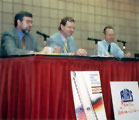U.S. Meeting of RIAS Fellows 1997
New Orleans, September 18–20

US fellow meeting in New Orleans at the RTNDA-Convention 1997. The Radio and Television News Directors Foundation (RTNDF) with its headquarters in Washington D.C. is the American partner organization of the RIAS BERLIN COMMISSION. The parent organization Radio and Television News Directors Association (RTNDA) organizes the annual RTNDA-Convention where topical US media issues are discussed.
- Thursday, September 18
Joint reception by the RIAS BERLIN COMMISSION, Missouri University and the RTNDF.
- Friday, September 19
Panel discussion: German-US relations: Serious dissonances or normal irritations?
Participants: Leo Wieland, FAZ-Correspondent, Washington D.C., Judd Ginsberg, CNN State Department, Producer,
Host: Rainer Hasters, Executive Director, RIAS BERLIN COMMISSION
- Saturday, September 20
The RIAS BERLIN COMMISSION: A transatlantic bridge in the field of broadcasting — breakfast meeting for US-Fellows
At the meeting Leo Wieland delivered a speech based on his following article.
GERMANY’S IMAGE IN AMERICA
The image of Germany in America, clearly defined during the decades of the Cold War and characterized by friendly relations at least with West Germany is now becoming blurred. Unification again caused a wave of unprecedented interest, even in comparison with other European countries. Confidence that the efficient and hard-working Germans would be able to handle the situation was actually greater in the United States than among the Germans themselves. Following unification, transatlantic relations gradually assumed a new look. The “story of the century”, i.e. the troublesome but successful growing together of a capitalist and formerly communist system, practically disappeared from the screen.
A new generation of journalists took over; television stations closed their Bonn or Berlin offices due to lack of funds: reporters with inadequate linguistic skills were assigned to cover everything between Sicily and Hammerfest, including Germany. The quality of print and broadcast items decreased, and so did inside knowledge of the country. Naivete and imported prejudices became more obvious. Now Germany frequently appears as an exotic curiosity pressed into yesterday’s stereotypes.
Although regrettable, this would not be a disaster if it did not have indirect political consequences. Sometimes the most harmless stories — about sausages, beer, or the speed limit on the autobahn — deteriorate into caricatures with a Nazi label. Current events are seen more often in terms of the gloomy past of Germany than the present. As the communist scare retreats into the grey zone of oblivion, the Holocaust has become the new bogeyman. With less attention to German democracy, the use and abuse of a simplified version of history becomes all the more tempting. In this context, the controversy surrounding Daniel Goldhagen’s collective accusations was almost a laudable exception, because victims with a long memory and renowned historians were provoked to object.
Those who read American coverage of the State Department’s annual report on human rights could well get the impression that, unfortunately, in some “uncivilized” countries (i.e. North Korea, Iraq, Germany) these rights are still violated. It is a worrying sign of transatlantic alienation that this characterization was accepted with little protest, just as Scientology’s infamous and foolish advertising campaign — putting today’s German politicians on the same level as prominent Nazis — evoked little protest in the U.S.
Where are the Germany experts from the present and former administrations in Washington who know better? Where are the Germany-friendly Senators and members of Congress who could talk about their personal experiences? Where are the “Germanists” from the “think tanks” — the commentators, diplomats, professors and fellows of German foundations — who could put German reality into credible perspective for the American public? With only a few exceptions, they are surprisingly silent.
It should be seen as a warning sign that the climate of informed mutual trust between two countries which share paramount values and interests can be poisoned by petty criticism bordering on absurdity. It seems that without the threat from an enemy behind the Iron Curtain, not necessarily the degree of common interest, but definitely the degree of practical solidarity, is decreasing due to growing indifference.
This situation is complicated by the disengagement of Americans in Germany: the closing of consulates and America Houses, fewer language students, less interest in travel to Germany by Congressional delegations. The reduction of troops also has contributed to a blurring of the realistic image of Germany. Millions of American soldiers used to become friendly “multipliers” of a pro-Germany point of view. This constant flow of positive information has dwindled to a mere trickle.
Because the distance between the two nations has grown so wide in the few years of the “new normality”, resentment — which we believed had been overcome — is again being exploited for political or other individual interests. That is why Germany has to make every effort to counteract this trend — through youth exchanges, meetings with members of Congress, and contacts with social organizations (particularly Jewish ones). It would suit Ger-many well to show a little more healthy self-esteem as a constitutional state whose laws are based on bitter historical experience. Friendliness to Germany is still deeply rooted in the American public, as well as in the White House. The level of mutual understanding, however, has decreased — and some expertsin Washington seem not to have the courage to admit this.
